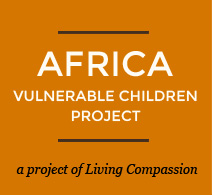This morning began just as yesterday did, with a cheerful greeting from Friday and an early dash to Kantolomba. Immediately upon arrival we went to check on the carpenters. They finished roofing Anne's house yesterday, we learned, and began on Regina's this morning. Regina guided us from the Living Compassion property to her home, which lies on the upper edge of the compound and overlooks the community. Here we found "the boys," as they are known to the women, hard at work.
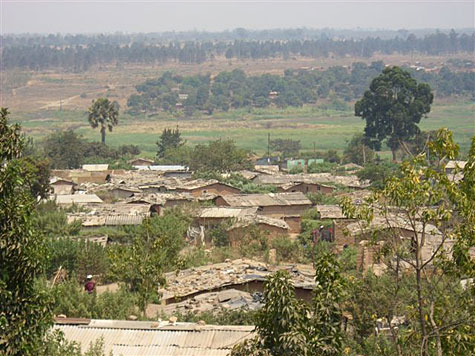
The view from Regina's house
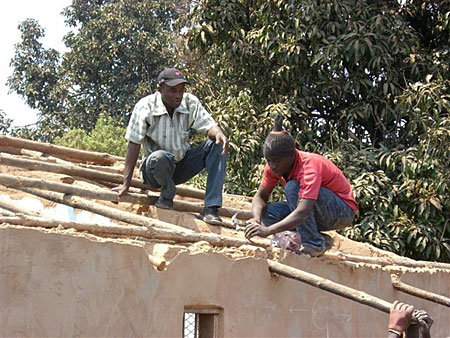
Friday and Evaristo on the roof
Their first step is to install the round poles they employ here to hold up the metal roofing sheets. These poles are an integral part of the local economy, along with grass for thatched roofs and reeds for making the mats people use here while sitting on the ground. All of these materials are harvested from "the bush." Kantolomba lies on the very edge of Ndola; the bush begins at the edge of the compound, so the people of Kantolomba have easier access to these resources than people living closer to town. Every day you can see people hauling raw materials from the bush on their backs and carrying them to town to trade for "kwacha," the local currency.
While we watched the poles being installed, Theresa asked Regina for permission to tell the story of how she became involved with Living Compassion. The story goes something like this:
Regina was married to a man who worked in the government in some capacity. He was unfaithful to her and contracted HIV. He did not tell Regina that this had happened and so infected her also. Then he began to die.
As the wife of a government worker Regina was entitled to a sizeable life insurance benefit. Unfortunately, before he died Regina's husband made some sort of deal that destroyed nearly all of the benefit that she was due. Regina was unable to access even the little that remained--a poor person has no power here as everywhere, and they simply refused to give it to her. Suddenly Regina was left without means to care for her nine children. Then, as if that wasn't bad enough, she developed a sore on her leg that became infected. She did not have the money to seek medical treatment. The sore got worse and worse, and gradually Regina resigned herself to an early death.
Theresa discovered her in this state and invited her to join the Living Compassion team. We helped her recover the remaining money that was due to her, took her to the clinic to get her wound treated, and put her to work with a salary. Regina's life changed completely over a few short weeks, and she is now putting a new roof on her house. Imagine Regina's smile as she heard all of this described!
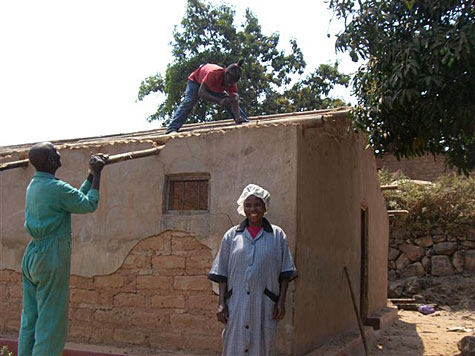
Regina (in her cooking clothes and hair net) and Pascal
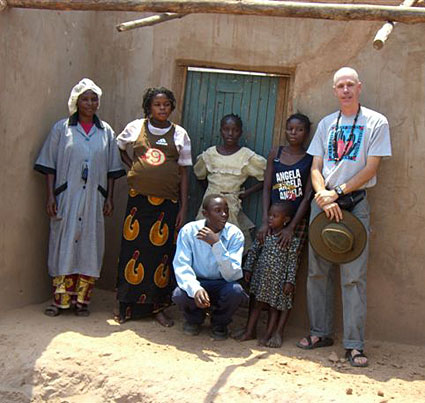
Regina with children and granddaughter in front of her house
We all enjoyed the story so much that we asked Theresa to tell us some more. She said that everyone who works for Living Compassion has a tale much like Regina's. Each person has in some way traded a life of hopelessness and despair for a life of hope and possibility. She shared several of their stories with us. The one that affected us the most was Anne's.
Anne does not know how old she is but is probably around seventy. She brought five children into the world. Over the course of her life she has endured the death, one by one, of each of them. The last one, her youngest boy, died just a few months ago. The affect of the most recent death was to end Anne's own chance of living out her old age, if things had gone as they ordinarily would have. People here depend upon their children to care for them at the end of their lives. Those who have no children will likely starve to death as soon as they become too old to work. "She had no idea even who would bury her," Theresa said.
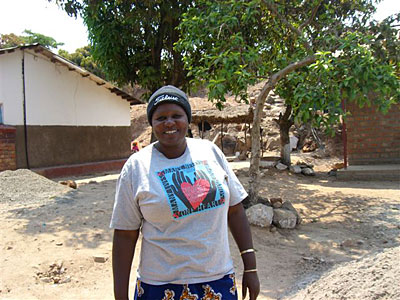
Beautiful Theresa
As with Regina, it was at this point that Theresa noticed her and asked that she be brought onto the Living Compassion team. Anne is now the person in charge of tending to the community water spigot and collecting the bits of money people give in exchange. She has no English and cannot tell us herself how grateful she is, but it is easy to see.
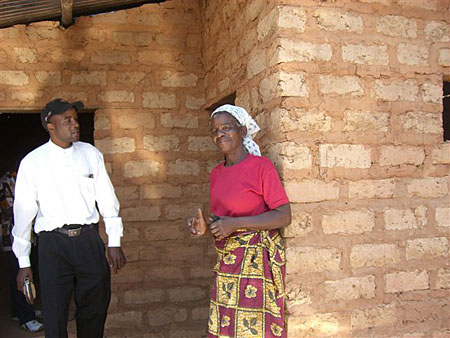
Anne (with Friday)
Here is one more story we enjoyed:
Martha used to make a living (barely) brewing the local corn liquor that is sold in the bars on the way to the cemetery. She hated it, partly because she could see the way drinking destroys the lives of people in the community, and partly because it is a filthy, unpleasant, and unprofitable way to live. As with so many in Kantolomba, however, she had no choice: she must either brew the liquor or permit her family to starve.
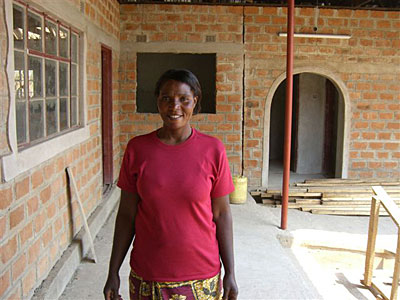
Martha
Once again, Theresa and Living Compassion came to the rescue. Theresa has an unfailing ability to see the good in people and to find appropriate ways for people to express that goodness. Seeing how much Martha wanted to do good work and give something to her community, Theresa brought her on to the team. The day after Martha was first paid, she gave away her brewing barrels and swore that she would never make liquor again as long as she lives.
Thinking about these stories during the walk back to our property, we asked Theresa why people are not begging her all the time to become involved. "They are!" Theresa told us. "They come to my house (a two-hour walk from Kantolomba) as early as five in the morning!" Luckily, there is plenty of work to do. We are feeding 350 of the three thousand hungry children here. Perhaps some day we can bring the whole community on board.
Arriving back at the property, coincidentally, we found four new employees waiting to greet us: two women who will join the team that cooks for the children, and two security guards who watch the place at night.
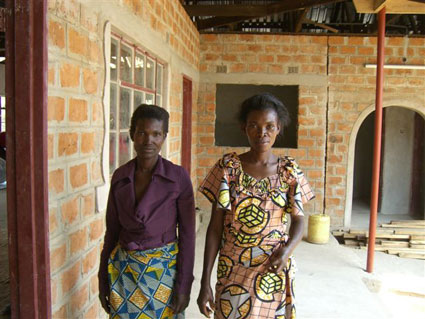
Agnes and Foster
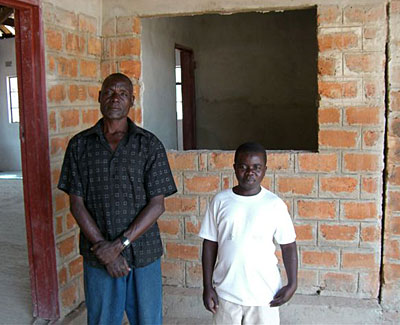
Jackson and Winter
We also found two men waiting to be interviewed in the hopes that they might become members of Friday's carpentry team. We had decided before this current trip that we would like to hire two more men. Upon arrival here we asked the women already on the team for their recommendations, and these two men, Peter and Rubin, were the ones they chose. Both have worked on the construction of the medical building at various times, both have a reputation as hard workers, and both can be counted on to remain sober (a crucial qualification), the women said.
Friday conducted the interview while Theresa translated. When the men had come to understand the job, the drinking policy (absolutely none), the salary, the hours, and all other details of this sort, Friday explained to them the attitude of mind we expect from our employees.
For Living Compassion, he explained, everyone is equal. Everyone is equally worthy of compassion. No person is more important than or more worthy of respect than another. "Here there are no women and men," he told them. "There are just people." There are no jobs that only women do and only men do. Everyone is expected to help out in whatever way they can. People are here to work and earn a salary, but also to serve the community, and everyone is expected to give as much as they are able to the common good. Friday also explained that honesty and integrity are the foundation of the relationships between the people of Living Compassion. He then asked the two men if they shared, or if they would be willing to adopt, this attitude of mind.
Rubin and Peter agreed immediately. With that, we told them they were hired, and the two expressed their gratitude for being given the opportunity. We stood up, shook hands to seal the deal, and then the men went home to prepare themselves, as they will begin work tomorrow.
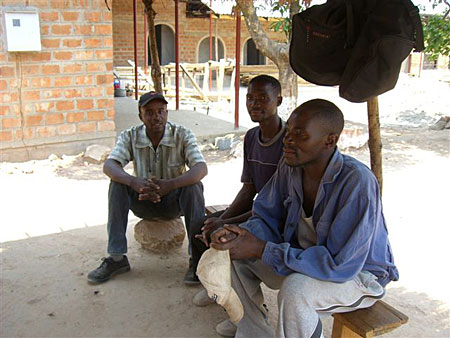
Friday with Rubin and Peter
The women then let us know that lunch was ready, and we all ate together inside the new building, on reed mats spread on the floor.
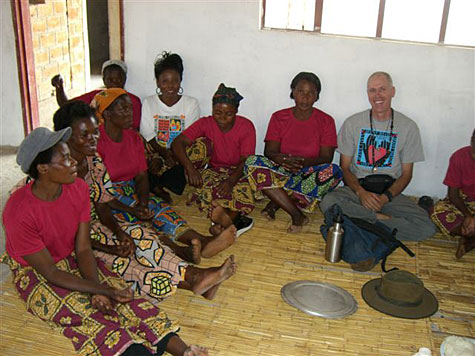
Dave and some of the gals
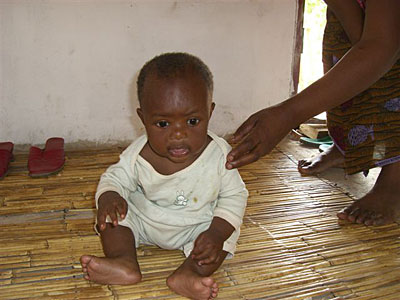
Baby David shows for lunch, too.
The remainder of the day was filled with the sorts of things that are vitally important to the success of a project like ours but not so interesting to relate (bookkeeping, for example). Around 4:00 we wrapped things up, and headed back to the Castle Lodge for supper.
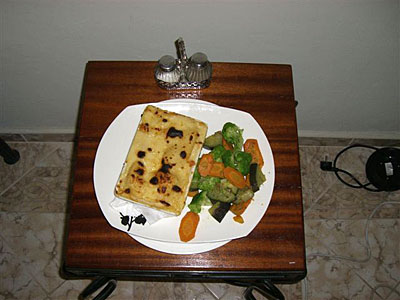
Vegetarian lasagna--yum
